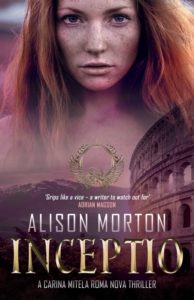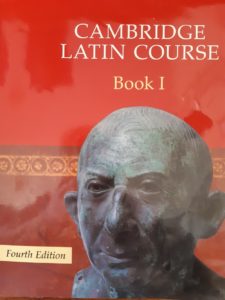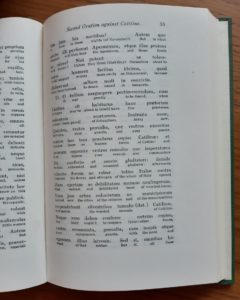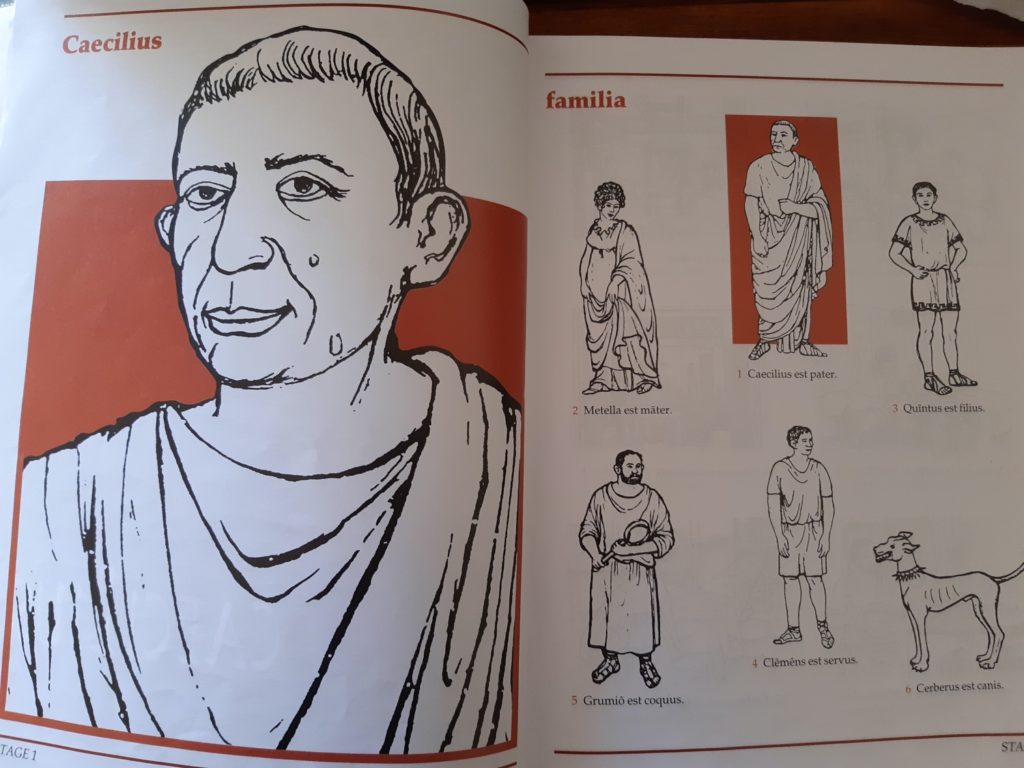 I’m delighted to welcome Debbie Young back to my writing blog, especially on subjects dear to my heart – Latin and learning languages! Debbie writes funny, feel-good fiction set in the English Cotswolds, where she’s lived for nearly 30 years. Her latest novel, Murder Your Darlings, the sixth Sophie Sayers Village Mystery, has fun with another branch of the classics, when Sophie, armed with a copy of Homer’s Odyssey and a Greek phrase book, joins a writers’ retreat on a small Greek island off Ithaca. Murder Your Darlings is now available in paperback and as an ebook in all the popular ereading formats.
I’m delighted to welcome Debbie Young back to my writing blog, especially on subjects dear to my heart – Latin and learning languages! Debbie writes funny, feel-good fiction set in the English Cotswolds, where she’s lived for nearly 30 years. Her latest novel, Murder Your Darlings, the sixth Sophie Sayers Village Mystery, has fun with another branch of the classics, when Sophie, armed with a copy of Homer’s Odyssey and a Greek phrase book, joins a writers’ retreat on a small Greek island off Ithaca. Murder Your Darlings is now available in paperback and as an ebook in all the popular ereading formats.
Until recently Debbie was the commissioning editor of the Alliance of Independent Authors’ prestigious blog and is a general independent fiction champion.
Over to Debbie…
No, linguam latinam disco isn’t a new dance craze – it’s evidence of my new hobby. “Disco” is Latin for “I learn”. Who knew? Not me, until this year, when I started learning more about this fascinating language that gave so much to my native tongue, English. If you’re wondering why I’m currently learning Latin at my age, blame Alison Morton! (Oops!)
 In 2013, when Alison published INCEPTIO, the first in her Roma Nova series, and used a Latin word as its title, she planted a seed of regret in my mind that I’d never continued the Latin lessons I began at school. After taking evening classes in holiday Greek, (I spent a lot of time island-hopping in the Ionian,) I was enjoying recognising the Greek roots of English words. Surely Latin would offer similar rewards? Albeit it without the sun-kissed sailing trips.
In 2013, when Alison published INCEPTIO, the first in her Roma Nova series, and used a Latin word as its title, she planted a seed of regret in my mind that I’d never continued the Latin lessons I began at school. After taking evening classes in holiday Greek, (I spent a lot of time island-hopping in the Ionian,) I was enjoying recognising the Greek roots of English words. Surely Latin would offer similar rewards? Albeit it without the sun-kissed sailing trips.
I knew, like Greek, that Latin needn’t be difficult. In my teens, as a pupil at a girls’ grammar school in London, I’d expected Latin to be difficult, because we’d been streamed for our choice of a second language after the compulsory French. Although ostensibly invited to choose Latin, German or Spanish, it soon became clear that the more academic were directed into Latin, regardless of their preference. What I didn’t expect was that it would be fun and funky.
The first phrase we learnt was “Salve, Magistra!” to greet our teacher, Miss Dowding, as she entered the classroom. This sweet, gentle lady exuded an old-fashioned air, but her teaching resources proved bang up to date when she handed out funky-coloured illustrated pamphlets instead of conventional text books –tangerine for the first course (well, this was the 1970s), azure for the second, emerald green for the third.
The brand-new Cambridge Latin Course was hailed by academics as revolutionary. Never mind grammar, they plunged us straight into story, with a high ratio of illustration to text. The narrative, though simple, smacked of reality, detailing the daily life of one Lucus Caecilius Iucundus, an actual citizen of Pompeii. Maybe knowing that Caecilius was about to buried under Vesuvius’s deadly ash was meant to add to a sense of excitement and urgency to our studies. Quick, learn the language before the volcano blows!
However, Caecilius was still alive and kicking when we parted company prematurely. At the end of my second year of Latin, my family moved from London to Frankfurt, where I joined Frankfurt International School, whose language curriculum was restricted to English, French and German. (I took all three.)
Over sixty nationalities were represented on the school roll, with dozens of native languages between them, but sadly not a single Roma Novan, although I think Roma Nova’s diplomats’ children would have been right at home in this European banking capital. (Ita vero!)
The only exercise my Latin had at FIS was on a history field trip, where I stunned my teacher, a native New Yorker, by casually translating the inscription on an ancient Roman arch.
Only recently did I find a way to fit Latin studies into my busy life, when my teenage daughter introduced me to the free Duolingo online app. She’d been using it to maintain her GCSE French, and to learn Italian, German and Gaelic (her father’s Scottish) from scratch. Other options include Esperanto, Klingon and whatever it is they speak in The Game of Thrones.
The little green owl, Duo, makes learning languages feel like an online game. Duolingo is highly addictive, its league table bringing out my competitive streak. The lessons are short and simple, although the phrases taught are sometimes not the obvious ones you might need to get around ancient Rome.
Drunken parrots and dirty weasels feature frequently. For more bizarre examples of unlikely phrases in all its languages, follow the Twitter account @shitduosays, which makes me weep with laughter. (One of my favourites – Alison)
 Fun as Duolingo is, I was still hankering after something more formal, so on a whim, I looked up my old school texts online, hoping a vintage books stockist might have one tucked away gathering dust. To my surprise, nearly fifty years since its launch, the Cambridge Latin Course is currently Amazon UK’s bestselling Latin book! It has become a classic. And that makes me feel about as ancient as a Roman.
Fun as Duolingo is, I was still hankering after something more formal, so on a whim, I looked up my old school texts online, hoping a vintage books stockist might have one tucked away gathering dust. To my surprise, nearly fifty years since its launch, the Cambridge Latin Course is currently Amazon UK’s bestselling Latin book! It has become a classic. And that makes me feel about as ancient as a Roman.
Even more remarkably, when I posted about this discovery online, a friend alerted me to an episode of Doctor Who, set in Pompeii in its final days, featuring – you’ve guessed it – Caecilius and friends. Enjoy it on Netflix or sample the episode on YouTube
 Now I’m finding opportunities to use my growing knowledge of Latin on an almost daily basis, whether understanding the origin of an English word for the first time, glad to know why phrases such as caveat emptor mean what they do, rather than just taking it on trust, or hearing Latin words and phrases on television programmes such as Upstart Crow, in which snobbish Robert Greene mocks Shakespeare for his lack of a classical education. (See Series 1, episode 6, from 1m43secs in for a prime example)
Now I’m finding opportunities to use my growing knowledge of Latin on an almost daily basis, whether understanding the origin of an English word for the first time, glad to know why phrases such as caveat emptor mean what they do, rather than just taking it on trust, or hearing Latin words and phrases on television programmes such as Upstart Crow, in which snobbish Robert Greene mocks Shakespeare for his lack of a classical education. (See Series 1, episode 6, from 1m43secs in for a prime example)
I’m also discovering more Latin books to help me expand my knowledge, such as a beautiful hardback copy of Cicero’s Orations, stumbled upon in the Bookbarn. The Latin text has a parallel English translation, with alternate lines in original Latin and English translation throughout. An idea for a future foreign language edition of Alison Morton’s Roma Nova novels, perhaps?
Bring it on, I say! Or rather, quaeso, scriptor!
(Forsan et haec olim facere juvabit Debora!)
–––––––––––––
Connect with Debbie:
Website: www.authordebbieyoung.com
Facebook: www.facebook.com/AuthorDebbieYoung
Twitter: www.twitter.com/DebbieYoungBN
Instagram: www.instagram.com/DebbieYoungAuthor
The ebook of the first Sophie Sayers adventure, Best Murder in Show, is currently free to download.
––––––––––––
Read Debbie’s latest book
When Sophie Sayers joins a writers’ retreat on a secluded Greek island, she’s hoping to find inspiration and perhaps a little adventure. Away from her rural English comfort zone, she also takes stock of her relationship with her boyfriend Hector.
But scarcely has the writing course begun when bestselling romantic novelist Marina Milanese disappears on a solo excursion to an old windmill. First on the scene, Sophie is prime suspect for Marina’s murder. When a storm prevents the Greek police from landing on the island to investigate, Sophie must try to solve the crime herself – not easy, when everyone at the retreat has a motive.
As she strives to uncover the truth about Marina’s fate, Sophie arrives at a life-changing decision about her own future.
Buy Murder Your Darlings:
Download the ebook for any ereader: https://books2read.com/u/mZKZDJ
Order ebook or paperback via Amazon: viewbook.at/MYD
Alison Morton is the author of Roma Nova thrillers – INCEPTIO, PERFIDITAS, SUCCESSIO, AURELIA, INSURRECTIO and RETALIO. CARINA, a novella, and ROMA NOVA EXTRA, a collection of short stories, are now available. Audiobooks are available for four of the series. NEXUS, an Aurelia Mitela novella, is now out.
Find out more about Roma Nova, its origins, stories and heroines… Download ‘Welcome to Roma Nova’, a FREE eBook, as a thank you gift when you sign up to Alison’s monthly email newsletter. You’ll also be first to know about Roma Nova news and book progress before everybody else, and take part in giveaways.















Leave a Reply